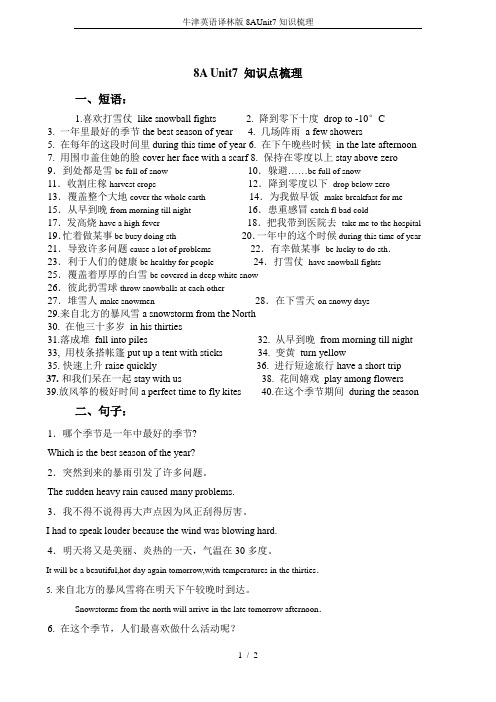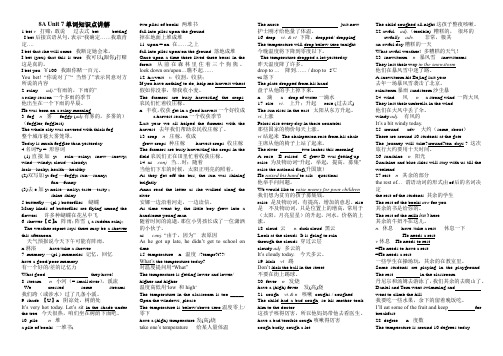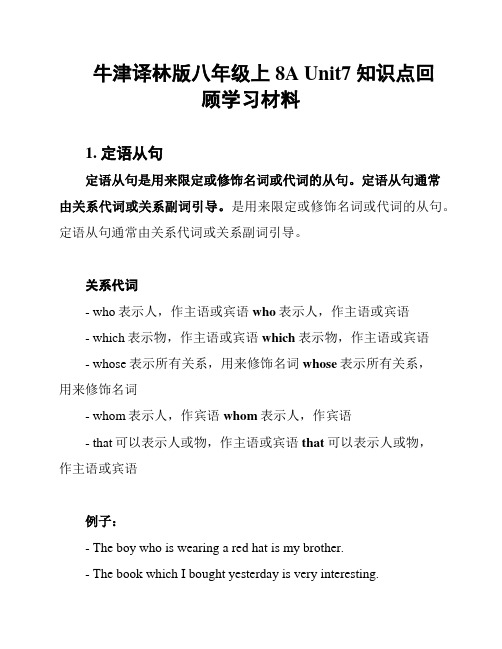牛津译林版八年级上 8A Unit7 知识点梳理学案(无答案)
牛津译林版八年级上 8A Unit7 知识点总结学习资料

牛津译林版八年级上 8A Unit7 知识点总结学习资料Unit Overview本单元主要介绍了动词的时态用法,包括一般现在时、一般过去时和一般将来时。
同时,还包括了一些与时间和日常活动相关的词汇和表达方式。
Grammar Points1. 一般现在时一般现在时用于描述经常性或普遍的情况、惯、事实和真理等。
例如:- I usually go to school by bus.- The sun rises in the east.- She likes playing basketball.2. 一般过去时一般过去时用于描述发生在过去的动作、状态或惯。
通常与过去的时间状语连用。
例如:- Last night, I watched a movie with my friends.- They lived in Beijing for five years.- He played the piano when he was a child.3. 一般将来时一般将来时用于表达将来发生的动作、事件或决定。
常和一些表示将来的时间状语连用。
例如:- I will go to the supermarket tomorrow.- They are going to visit their grandparents next month.- We plan to go on a vacation next week.Vocabulary下面是与时间和日常活动相关的一些词汇和表达方式:- morning: 早晨- afternoon: 下午- evening: 晚上- night: 夜晚- wake up: 醒来- brush teeth: 刷牙- have breakfast/lunch/dinner: 吃早餐/午餐/晚餐- go to school/work: 去学校/上班- do homework: 做作业- play sports/games: 进行体育运动/玩游戏- watch TV: 看电视- go to bed: 上床睡觉以上是本单元的主要知识点总结。
牛津英语译林版8AUnit7知识梳理

8A Unit7 知识点梳理一、短语:1.喜欢打雪仗like snowball fights2. 降到零下十度drop to -10°C3. 一年里最好的季节the best season of year4. 几场阵雨a few showers5. 在每年的这段时间里during this time of year6. 在下午晚些时候in the late afternoon7. 用围巾盖住她的脸cover her face with a scarf8. 保持在零度以上stay above zero 9.到处都是雪be full of snow10.躲避……be full of snow11.收割庄稼harvest crops 12.降到零度以下drop below zero 13.覆盖整个大地cover the whole earth 14.为我做早饭make breakfast for me 15.从早到晚from morning till night 16.患重感冒catch fl bad cold17.发高烧have a high fever 18.把我带到医院去take me to the hospital 19.忙着做某事be busy doing sth 20.一年中的这个时候during this time of year 21.导致许多问题cause a lot of problems 22.有幸做某事be lucky to do sth.23.利于人们的健康be healthy for people 24.打雪仗have snowball fights25.覆盖着厚厚的白雪be covered in deep white snow26.彼此扔雪球throw snowballs at each other27.堆雪人make snowmen 28.在下雪天on snowy days29.来自北方的暴风雪a snowstorm from the North30. 在他三十多岁in his thirties31.落成堆fall into piles 32. 从早到晚from morning till night 33, 用枝条搭帐篷put up a tent with sticks 34. 变黄turn yellow35.快速上升raise quickly 36. 进行短途旅行have a short trip 37.和我们呆在一起stay with us 38. 花间嬉戏play among flowers39.放风筝的极好时间a perfect time to fly kites 40.在这个季节期间during the season二、句子:1.哪个季节是一年中最好的季节?Which is the best season of the year?2.突然到来的暴雨引发了许多问题。
译林英语八上Unit 7 知识要点梳理及精选练习--江苏无锡天一中学年牛津译林版英语八年级上册

英语8A Unit 7 知识要点梳理及精选练习一.重点单词、短语、句子Comic---Task1.Then hide from the April showers. 有时候要躲避四月阵雨的突袭。
(P82)①“hide from”意为“躲避,使…看不见”, hide的过去式_________ 捉迷藏______________Eg: Jimmy , how can you hide from us in such a small corner? Are you OK?②“shower”这里意为“阵雨”,另一个重要含义“沐浴,淋浴”,洗澡______________________Eg: 看到太阳雨真惊奇! _________________________________________________!解析:hid(---hidden), hide and seek, take/have a showerHow amazing it is to see the shower!2. “by , near, beside”: Can I have a look at the bookcase _______ the window?(靠窗)Could you tell me how I can get to a hospital ________here?When an earthquake happens , make sure not to stand_______tall buildings.He sat______the table and began to have dinner as if nothing happened just now.解析:by, near, beside, at/beside3.Fall into piles upon the ground. (片片)掉落在地上。
译林版牛津英语8A Unit 7单词知识点讲解

8A Unit 7单词知识点讲解1.bet v. 打赌;敢说过去式bet bettingI bet后接宾语从句,表示“我确定……我敢肯定….I bet that she will come. 我断定她会来。
I bet (you) that this is true. 我可以(跟你)打赌这是真的。
I bet you ¥100. 我跟你赌一百元。
You bet! “你说对了”“ 当然了”表示同意对方所说的内容2. rainy adj.“有雨的,下雨的”a rainy season一个多雨的季节他出生在一个下雨的早晨。
He was born on a rainy morning.3. fog n. 雾foggy (adj.有雾的,多雾的)(foggier, foggiest)The whole city was covered with thick fog.整个城市被大雾笼罩。
Today is much foggier than yesterday.4.名词+y = 形容词(1)直接加y: rain—rainy; snow—snowy; wind—windy; cloud—cloudy;luck—lucky; health—healthy(2)双写加y: fog —foggy; sun—sunny;fun—funny(3)去e加y: noise—noisy; taste—tasty ;shine-shiny5.butterfly —(pl.) butterflies 蝴蝶Many kinds of butterflies are flying among the flowers. 许多种蝴蝶在花丛中飞6. shower 【C】n. 阵雨;阵雪( a sudden rain);The weather report says there may be a shower this afternoon.天气预报说今天下午可能有阵雨。
牛津译林版八年级上 8A Unit7 重要知识点归纳

牛津译林版八年级上 8A Unit7 重要知识点归纳本文档旨在归纳牛津译林版八年级上册第7单元(Unit7)的重要知识点,帮助同学们更好地研究和掌握该单元的内容。
1. 单词和短语- silk(丝绸): a soft, delicate and shiny fabric made from the threads produced by silkworms.- cotton(棉花): a soft, fluffy fiber that grows in a boll, or protective case, around the seeds of cotton plants.- linen(亚麻布): a fabric made from flax fibers that is known for its coolness and freshness.- wool(羊毛): the soft, thick hair that grows on the bodies of sheep and some other animals.- leather(皮革): a material made from the skin of an animal.- bamboo(竹子): a type of tall, woody grass that grows in tropical and subtropical regions.- originate(起源): to have a specific beginning or source.- export(出口): to send goods or services to another country for sale.- process(加工): to perform a series of actions or operations on something to change or transform it.- traditional(传统的): relating to the customs, beliefs and practices that have been passed down through generations.- production(生产): the process of making or manufacturing goods.- contribute(贡献): to give or provide something, such as money, help or ideas.- benefit(受益于): to gain advantage or profit from something.2. 重点句子- Silk originally came from China and was exported to other countries along the Silk Road.- Linen is a type of fabric that is made from flax fibers.- Wool is often used to make warm clothing because it is a good insulator.- Bamboo is a versatile material that can be used for making furniture, paper, and other products.- Traditional crafts play an important role in preserving cultural heritage.3. 文化背景本单元主要介绍了不同种类的纺织材料和其在各个国家的应用,以及传统工艺对文化遗产的保护。
牛津译林版八年级上 8A Unit7 学习要点总结

牛津译林版八年级上 8A Unit7 学习要点总结本文档总结了牛津译林版八年级上册第七单元的研究要点。
1. 词汇本单元的重点词汇包括:- volcano(火山)- ___(喷发)- disaster(灾难)- earthquake(地震)- tsunami(海啸)- ash(灰烬)- evacuate(疏散)- rescue(救援)- emergency(紧急情况)- relief(救济)2. 重点句型本单元的重点句型包括:- Have you ever experienced a natural disaster?(你曾经经历过自然灾害吗?)- What should we do in case of an earthquake?(发生地震时我们应该怎么办?)- It is ___.(在灾难中保持冷静是很重要的。
)- We must take ___.(我们必须立即采取行动确保每个人的安全。
)3. 语法要点本单元的语法要点包括:- 过去完成时:had + 过去分词,表示在过去某个时间点之前已经发生的动作或完成的状态。
- 被动语态:情态动词 + be + 过去分词,表示动作的承受者。
4. 阅读理解本单元的阅读理解部分包含了几篇关于自然灾害的文章,可以通过阅读来了解相关知识和培养阅读理解能力。
5. 写作训练本单元的写作训练主要是要求学生写一篇关于自然灾害的短文,可以包括自己的经历、了解和建议等。
6. 拓展研究学生可以通过额外的阅读、观看相关视频、访问相关网站等拓展研究,增加对自然灾害的了解。
以上是牛津译林版八年级上册第七单元的学习要点总结,希望对同学们的学习有所帮助。
牛津译林版八年级上 8A Unit7 知识点回顾学习材料

牛津译林版八年级上 8A Unit7 知识点回顾学习材料1. 定语从句定语从句是用来限定或修饰名词或代词的从句。
定语从句通常由关系代词或关系副词引导。
是用来限定或修饰名词或代词的从句。
定语从句通常由关系代词或关系副词引导。
关系代词- who表示人,作主语或宾语who表示人,作主语或宾语- which表示物,作主语或宾语which表示物,作主语或宾语- whose表示所有关系,用来修饰名词whose表示所有关系,用来修饰名词- whom表示人,作宾语whom表示人,作宾语- that可以表示人或物,作主语或宾语that可以表示人或物,作主语或宾语例子:- The boy who is wearing a red hat is my brother.- The book which I bought yesterday is very interesting.- The girl whose father is a doctor is my classmate.- The teacher whom we met at the library is very nice.- The car that is parked outside belongs to my neighbor.关系副词- where表示地点where表示地点- when表示时间when表示时间- why表示原因why表示原因例子:- This is the school where I studied last year.- I remember the day when we first met.- I don't understand the reason why he is angry.2. 情态动词情态动词是用来表示说话人的情感、态度或推测的动词。
常见的情态动词包括can, could, may, might, must, shall, should, will, would, ought to等。
2024年牛津译林版八年级英语上册8A Unit 7 单元教案

2024年牛津译林版八年级英语上册8A Unit7 单元教案一、教学内容本节课选自2024年牛津译林版八年级英语上册8A Unit 7,主要内容包括:Grammar(现在完成时态);Reading(旅行经历分享);Vocabulary(与旅行相关的词汇)。
二、教学目标1. 学生能够理解和掌握现在完成时态的构成和用法。
2. 学生能够通过阅读文章,了解旅行经历,并能用英语进行分享。
3. 学生能够熟练运用与旅行相关的词汇,进行日常交流。
三、教学难点与重点1. 教学难点:现在完成时态的构成和用法。
2. 教学重点:阅读理解能力的培养,词汇的运用。
四、教具与学具准备1. 教具:PPT、黑板、教学卡片。
2. 学具:课本、练习册、文具。
五、教学过程1. 引入:通过展示一组旅行图片,引发学生对旅行话题的兴趣。
2. 阅读理解:学生阅读课文,回答相关问题,了解旅行经历。
3. 例题讲解:讲解现在完成时态的构成和用法,结合例句进行演示。
4. 课堂练习:学生进行现在完成时态的句子练习,教师给予指导。
5. 词汇学习:学习与旅行相关的词汇,并进行小组讨论,运用词汇进行交流。
6. 小组活动:学生分组,运用所学词汇和现在完成时态,编写一段旅行经历对话。
7. 展示与评价:各小组展示成果,其他学生给予评价。
六、板书设计1. Unit 7 Travel2. 主要内容:Grammar: Present Perfect TenseReading: Travel experiencesVocabulary: Travelrelated words七、作业设计1. 作业题目:a. 根据所给图片,用现在完成时态描述旅行经历。
b. 编写一段旅行经历对话,运用所学词汇。
2. 答案:八、课后反思及拓展延伸1. 反思:关注学生在课堂上的参与度,及时给予指导和鼓励,提高学生的积极性。
2. 拓展延伸:鼓励学生课后进行实地调查,了解身边人的旅行经历,并用英语进行分享。
- 1、下载文档前请自行甄别文档内容的完整性,平台不提供额外的编辑、内容补充、找答案等附加服务。
- 2、"仅部分预览"的文档,不可在线预览部分如存在完整性等问题,可反馈申请退款(可完整预览的文档不适用该条件!)。
- 3、如文档侵犯您的权益,请联系客服反馈,我们会尽快为您处理(人工客服工作时间:9:00-18:30)。
8A Unit7 知识点解析1.bet--- ____________(过去式)I bet (that)…我敢说/打赌…I bet he knows all about it.2.with nothing on = without anything on e.g. You look cool with nothing on.= ___________3.weather [u]n.How is the weather? = __________ the weather like?How will the weather be? = ____________________________________________________? 今天天气真糟糕!____________________ weather it is! = ______________ the weather is!4.你最喜欢哪个季节?Which season do you like best? = ___________________________?5.It’s the best time/ a perf ect time for sb. to do sth. 对某人来说是做某事的最佳时节。
(类似)我第一次吃冰淇淋It’s _____________________________ for me to eat ice cream.真是放风筝的好时节啊!What a perfect time (it is) _______________ (fly) a kite!6.一首关于四季的诗_____________________ about the seasons一年四季seasons of the year7.be full of/ be filled with… 充满…= fill… with …The room was __________ (fill) with water by him. = He ________ the room ______water. cover vt. 覆盖 A cover B = B is covered with/in AWater covered the ground after the heavy rain.= The ground was ______________ ______________ water after the heavy rain.8.forget to do (未做)/doing (已做) 忘记做某事remember to do (未做)/doing (已做) 记得做某事e.g. I remembered ____________ (watch) a wonderful lesson in Huaiyin Middle School, but Iforgot ____________ (take) notes during the lesson.9.fly far away飞向远方fly--- __________(过去式)离…远1)表示两地距离:be far (away) from be +具体路程(away) from2)回答距离时away 不可省e.g. --- How far is it from the forest park to your school? --- Two kilometres________________.10.the days of spring = the spring days11.Bees and butterflies like playing among flowers. (对划线部分提问)_____________ do bees and butterflies like ___________?prep. among 用于三者或以上between 用于两者在他和我之间between ____________ and ____________ 12.hide--- __________ (过去式)hide vi. 躲避hide from sb./ sth. 躲避四月的阵雨___________the April showers vt. 藏把这本书藏起来hide the book hide oneselfTim _______ (hide) himself behind the door _______ (play) tricks on Tom the other day. 13.memory [c] 回忆美好的回忆sweet memories[u] 记忆力have a good/poor memory for sth.14. shade [u]n 在树荫下under the shade of the tree15. turn 1) 系动词树叶变黄Leaves turn brown 变得苍白turn pale2) 行为动词turn on/ off 打开;旋转turn over 翻身/转turn around 转身turn into 由一种状况转为另一种e.g. Caterpillars (毛毛虫) turn into butterflies.3) n. (多人依次) 轮到的机会It’s one’s turn to do sth.轮到我擦黑板。
It’s my turn to clean the blackboard.16. fall--- _________(过去式) 掉落fall over 跌倒很容易在冰上摔倒。
It’s easy to fall over on the ice.fall down 坠落fall down from sth. = fall off sth. 从… 上坠落The snow/rain ___________________(降落) heavily last night.fall into piles upon the ground 落地成堆pile [c]n a pile of …. 一堆… 成堆的树叶____________ leaves17. harvest v. 收割;收获收割庄稼________________ n. 收成have a good harvest18. as 1) conj. 当…….时; 正如as the saying goes/ as we all know随着as time goes by; as the temperature rises/ drops2) prep. 作为as a student/ teacherbe the same as … e.g. 我和你一样I am the same as you. 反义短语be __________________ be the same +n.单+ as e.g. He is the same weight/age/height as me. (描述某一方面一样)= He is as _____________/ ______________/___________ as me.实义动词the same +n.单+as e.g. He bought the same book as I did.19. rise/drop rise--- ____________ (过去式)drop--- ___________ (过去式)1)vi. 上升/下降到rise/drop to The sun/ flag/ voice/ blood pressure rises.drop out of /drop a little/ drop below zero2) n. a rise/drop in temperature20. …rhyme with … …和…押韵21. be busy doing sth. 忙于做某事be busy with sth. 忙于某事be too busy to do sth. 太忙了而未能做某事He is too busy ______(cook) breakfast for his son. be too busy doing sth. to do sth. 太忙于做某事而未能做某事He is too busy _________________ (finish) the paper _________________ (have) a good rest.22. 句子的基本组成部分为:主语(S)、动词(V)、宾语(O)动词可分为:行为动词【及物动词(vt.)、不及物动词(vi.)】和系动词。
其可展现句子的时态,是句子的核心。
五种句型:1) S+V e.g. The sun is shining.2) S+V+O e.g. They like staying at home. 此结构宾语只有一个3) S+V+P e.g. The idea sounds good.表语(P):是用来说明主语的系动词:1.be动词 2. 感官动词:feel, sound, smell, taste, look, seem3. 表变化become, get, turn, grow 表稳定状态keep, stay4) S+V+IO+DO e.g. He built the bird a wood house= He built a wood house _______ the bird.He sent me a postcard. = He sent a postcard __________ me.该结构动词后又两个宾语:直接宾语(DO)和间接宾语(IO) 可用介词____和____转换此结构通常情况下:间接宾语为人,直接宾语为物5) S+V+DO+OC e.g. He found his wallet lost.宾补(OC):用来补充说明宾语的行为或状态直宾和宾补在逻辑上构成主谓关系He found his wallet lost. = He found his wallet _________ _________.宾补:1. 名词或名词短语作宾补call sb. sth.2. 形容词或形容词短语作宾补make/keep/think/find sb./sth. adj.3. to do作宾补(带to) advise/want/wish/invite/ask/tell sb. to do sth.4. to do作宾补(不带to)+ doing作宾补: see/hear/notice sb. do/doing make/let sb. do ☆可在五种句型中添加时间状语、地点状语、方式状语She found herself a good runner 句型结构__________________________________________ Ann made her sister a paper rose as the birthday present. 句型结构_______________________ He is singing excitedly. 句型结构__________________________________________________ 23. wake up 醒来把我叫醒wake _______ up从早到晚from morning till night 踢球kick the ball24. be mainly +adj. 天气以干燥和晴朗为主be _________ (main) dry and sunny25. rest n.其余的部分(人或物)the rest of +n. 剩余的… (其作主语时,谓语动词由所接名词决定)e.g. The rest of the classmates ______________ (be) doing exercises carefully.The rest of the juice ________________ (go) bad.26. around adv. 大约be around 9。
